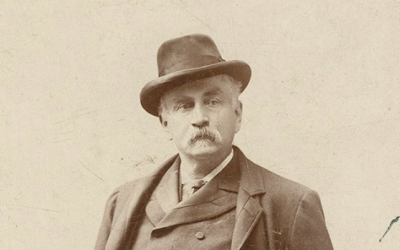The Sunday afternoon baseball game seems as American as mom and apple pie. But in the
early 1900s, playing baseball on Sunday was not only regarded by some as immoral–in
Nebraska it was illegal. The Criminal Code of Nebraska stated, “If any person shall be found
on the first day of the week, commonly called Sunday, sporting, rioting, quarreling, hunting,
fishing, or shooting, he or she shall be fined . . .or be confined in the county jail.” A Supreme
Court decision rendered in the 1890s construed baseball to be within the definition of
“sporting.”
Like other minor and obscure laws, the baseball prohibition was ignored in many
communities. Baseball was generally regarded as an “innocent, healthful amusement”–not
like boxing, cock fighting, card playing or other “games that have demoralizing tendencies.”
In Nebraska City, however, baseball was not viewed as benign. Church leaders campaigned
actively for enforcement of the Sunday baseball ban. In the summer of 1902 the whole town
became embroiled in the Sunday ball controversy.
The furor began when local ministers swore out complaints against members of the Argos,
the Nebraska City team. Several ball players were arrested in the middle of a Sunday game.
Ball fans were incensed. They organized, pooled their money for the players’ attorney fees,
and held a city-wide referendum on Sunday ball.
The election tallies were 825 in favor, 16 against. But on July 19, the day after the election,
the reverends again swore out warrants, which the sheriff was compelled to serve.
There were over a thousand people on the ball grounds, and the score stood Argos 3, Nib’s
Nine 1, when “Sheriff Shrader and his deputy walked onto the grounds and started to take
some of the players off.” A near riot ensued. “During the intense excitement that prevailed,
(Deputy Farley) drew his revolver, but seeing the mood of the crowd, put it back in his
pocket.” Eventually the lawmen and players departed, but “there was a large crowd followed
(them) up town.”
The next day, after the players had appeared in court, a “monster crowd” surrounded the
home of the Methodist minister, one of those who had sworn out the complaint. “The police
was unable to do anything with the crowd, being swept aside like a straw.” Fire Chief Bauer
finally calmed the mob, which dispersed.
Tensions ran so high in the town that on July 29 the mayor, who had tried to remain neutral,
decided to call a halt to ball games on the Sabbath.
Times change, of course, and ultimately the Sunday ball proponents triumphed.



